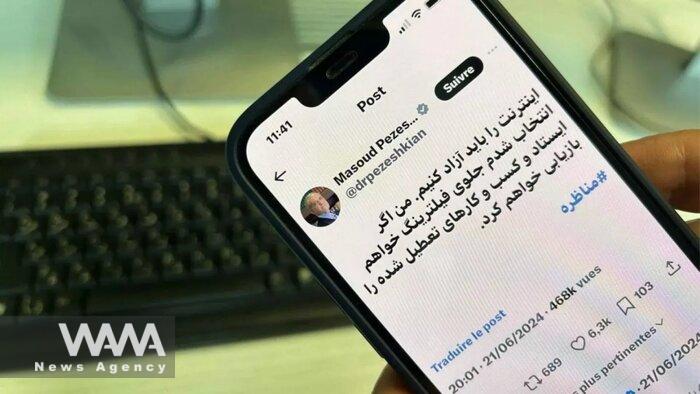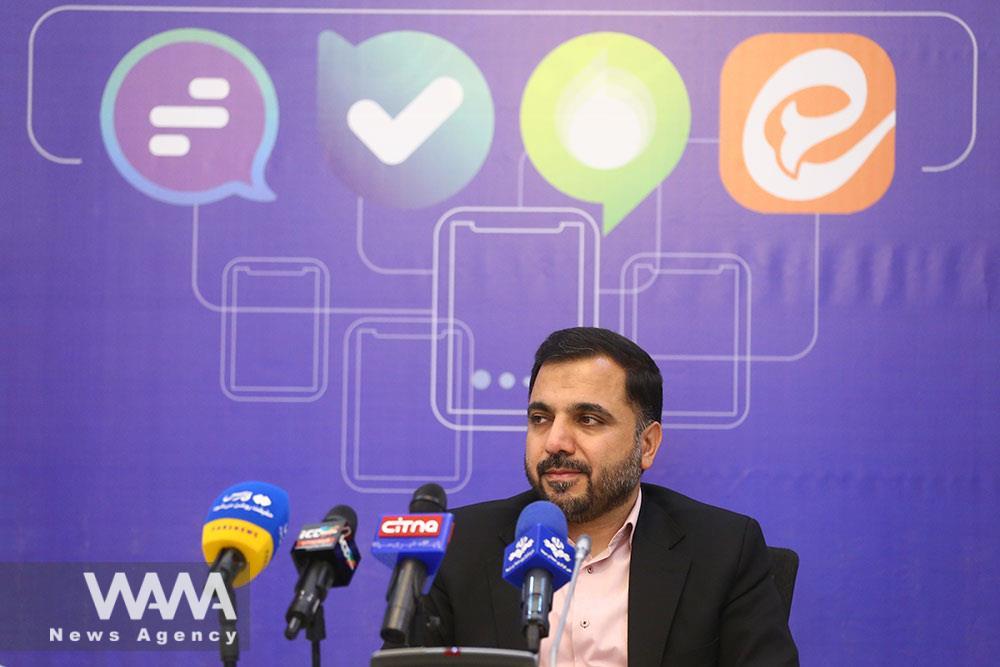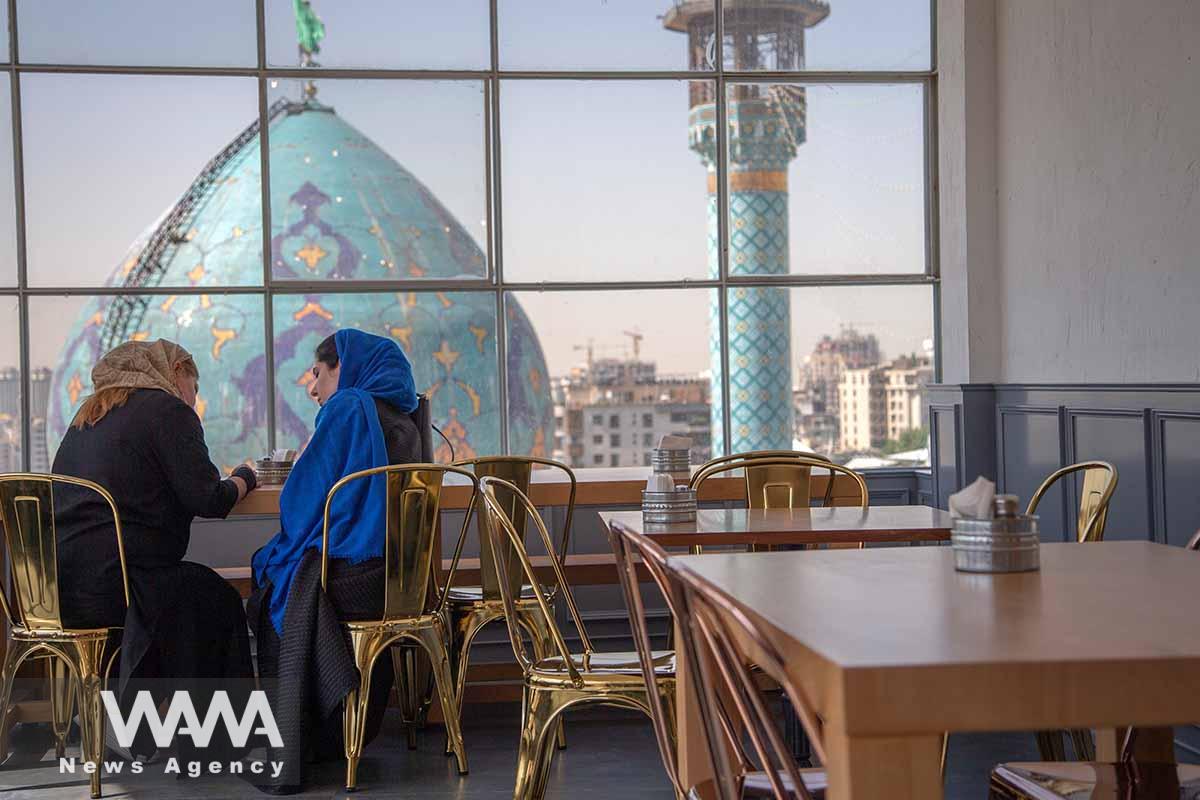New Openings in Iran’s Longstanding Filtering Dispute
WANA (Dec 25) – In recent years, the issue of internet filtering and lifting restrictions has become one of the key topics in Iran’s technology and communication policy-making. Recently, the announcement of the unblocking of two widely used platforms, WhatsApp and Google Play, has drawn the attention of experts and users, raising critical questions about the prioritization of these decisions and their implications.
During his election campaign, Masoud Pezeshkian promised to reduce internet restrictions and ensure free access to information for citizens. However, months into his presidency, only WhatsApp and Google Play have been unblocked, while popular platforms like Instagram and Telegram remain restricted. Some media outlets have described this move as a “minimal realization” of his electoral promises.

During his election campaign, Masoud Pezeshkian promised to reduce internet restrictions and ensure free access to information for citizens / WANA News Agency
When the news about unblocking WhatsApp and Google Play broke, many of us had a simple question: “Why these two? Why not Instagram or Telegram?” This question highlights a significant aspect of the policymakers’ strategy: slow but calculated movement.
Looking at the statistics, it becomes evident that WhatsApp and Google Play play a crucial role not just in terms of popularity but also in the economic lives of Iranians. According to a national survey, the five most popular social platforms in Iran are:
1. Instagram (72%)
2. Telegram (52%)
3. WhatsApp (46%)
4. Rubika (42%)
5. Eitaa (32%)

Iran: Foreign Social Media Platforms Must Follow Iran’s Regulations to Operate in Iran
WANA (Nov 06) – Today, Iran’s Minister of Communications, Sattar Hashemi, addressed questions about the possibility of opening official offices for platforms like Instagram and Telegram, which are currently filtered in Iran. Speaking on the sidelines of a Cabinet meeting, he stated, “These platforms need to adhere to certain rules governing the country; an unregulated […]
Iran’s Minister of Communications commented on these statistics, saying:
“Our decision-making is based on prioritizing the public’s needs. Platforms like WhatsApp are not just social communication tools but also essential for thousands of businesses.”
Google Play serves not only as a hub for accessing practical software but also as a vital engine for app developers. In a country where dozens of startups and digital businesses rely on modern technologies, the blocking of Google Play was a bitter irony. Former Iranian Minister of
Communications, Isa Zarepour, once emphasized: “Google Play is not just a platform for ordinary users but a critical tool for software developers and national cybersecurity. We have submitted requests to lift its block three times.”

Issa Zarepour, The Minister of Communications and Information Technology of Iran. ICT PR / WANA News Agency
On the other hand, WhatsApp is a tool for many economic actors to conduct business communications. As reported by media outlets:
“Economic activists have stated that the filtering of WhatsApp disrupted their interactions with foreign clients and increased costs by forcing them to use alternative channels.”
One of the reasons cited for Google Play’s blocking was that users could download VPNs through the platform. However, this reasoning raised many questions: How can combating the gray market of VPNs justify denying public access to a key platform? And now that the restriction has been lifted, will the VPN market truly be affected?
Comparisons with Telegram are particularly interesting here. When Telegram was blocked in Russia, its developers quickly provided a version that bypassed the need for VPNs. Iranian users, too, have found diverse solutions to circumvent restrictions and continue using Telegram.

Internet filtering in Iran, what are the reasons and justifications?
WANA (June 15) – In the first days of June 2023, Iran’s Interior Minister, Ahmad Vahidi, emphasized again, “Whenever foreign platform holders make commitments to the government and Ministry of Information and Communications Technology of Iran, a decision will be made about lifting filters on them.” He pointed out that, as per reports, they have […]
Imagine the digital life transformation if decisions were made to unblock Instagram and Telegram as well. However, the main question remains: Is Iran’s digital governance prepared for this change? And are the necessary foundations in place to create fair competition between domestic and foreign platforms?
To answer these questions, the following realities must be considered:
Domestic platforms have largely failed to gain public trust.
Users of foreign platforms are still willing to pay for access.
The reality is that users expect transparency and honesty from governments. Will the policy of unblocking platforms continue, or is this merely a tactical step? Surveys show that Instagram (72%) and Telegram (52%) remain the top choices for the public. Are these platforms also waiting for a better day?

Iran: A Heaven for Hackers Due to Filtering and VPN Usage
WANA (August 07) – The extensive use of VPNs and the ongoing internet filtering policies have turned Iran into a global heaven for hackers. Since the autumn of 2022, the use of VPNs in Iran has tripled. On average, each Iranian user spends 4 hours daily using VPNs. Statistics indicate that the national internet […]
Iranian internet users have expressed diverse opinions about this move. Some consider it insufficient and demand access to other popular platforms. One user reacted to the news by writing: “It takes strength—something they don’t have.”
Additionally, recent surveys indicate that 56.4% of VPN users are dissatisfied with frequent disconnections, and 52% complain about low speeds.
Decision-making regarding internet filtering in Iran is more like breaking dams. As one digital expert put it:”We don’t just need to lift restrictions but also to change the paradigm of digital governance. Building trust, ensuring transparency, and investing in domestic platforms are the keys to our progress.”
Iran’s Minister of Communications has explicitly stated that this is not the end of the road. But the question remains: Will the approach to managing the digital space be limited to lifting restrictions, or will there be a roadmap for infrastructure development, fostering real competition between domestic and foreign platforms, and rebuilding public trust?













